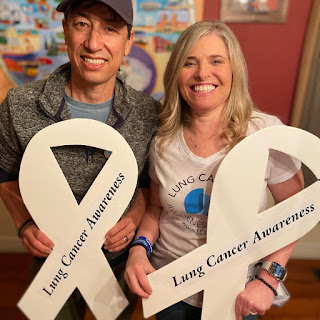Why Philanthropy Matters
We’ve all
heard the phrase “the system is broken”. Unfortunately, this could be referring
to many things – politics, education, law, government, you name it – but the “system”
of funding basic cancer research truly is broken. Watch the news and you will think we are
making progress in the fight against cancer – we hear about immunotherapy and
nanotechnology, precision medicine, the
moon shot, etc. There are new FDA
approvals of new drugs from big pharma, biotech companies going public, venture
capital supporting up and coming companies, etc. And yes, we are definitely
making progress. But I believe that most people don’t realize that we could
accelerate this progress if we put more seed money into the hands of
researchers on the front lines. The system really is broken. And the reality is that philanthropy is
critical in our current funding model in order for us to help advance
innovation – to help scientists work on discoveries that just don’t exist
today.
I’ve spoken
to several scientists doing basic cancer research and what I hear is very
consistent – they spend 70-80 percent of their time on raising money for their lab,
writing grants or seeking donations from private sources. The institutions
where the scientists work are not providing full funding for their lab, and
this is what I think most people don’t realize. These scientists are under extreme
pressure to find money to keep their lab operating. Do we really want our
brilliant scientists spending the majority of their time on fundraising? I’d
rather they spend 100% of their time in the lab, wouldn’t you? And, if you are a cancer scientist, even at a major
hospital or university, and you get
funding from a National Institutes of
Health (NIH) grant, there is an almost 90% chance you may not get another
grant when it expires. Yes, your chance of getting an NIH grant in oncology is
about 11%. So the responsibility to keep the lab operating (funded) is on the
scientist. I suppose it is like a law firm where you have to provide billable
hours to support your position with the firm, but it feels different to me when
it is about focusing time in a laboratory. I think we should trust that the
scientists need the time to test their ideas.
All of this
was on my mind when I attended the World
Medical Innovation Forum in Boston last week. The Forum is a gathering of
senior corporate, investor and academic leaders, organized by Partners HealthCare Innovation, a
division of Partners HealthCare
dedicated to advancing the commercial application of the capabilities of
Partners’ academic medical centers. The Forum highlighted topics such as emerging
cancer innovations in immunotherapy, epigenetics, early diagnosis, combination
therapies, curative drugs, and the role of patients in innovation. The last
part of the Forum was a showcase of the most promising cancer technology
innovations from around the world — the 12 technologies with the potential to
revolutionize cancer treatment and patient care over the next decade called “The
Disruptive Dozen.” And this is what got me revved up about how philanthropy
really matters if we want to advance these identified promising ideas.
#CancerResearchEvangelist


